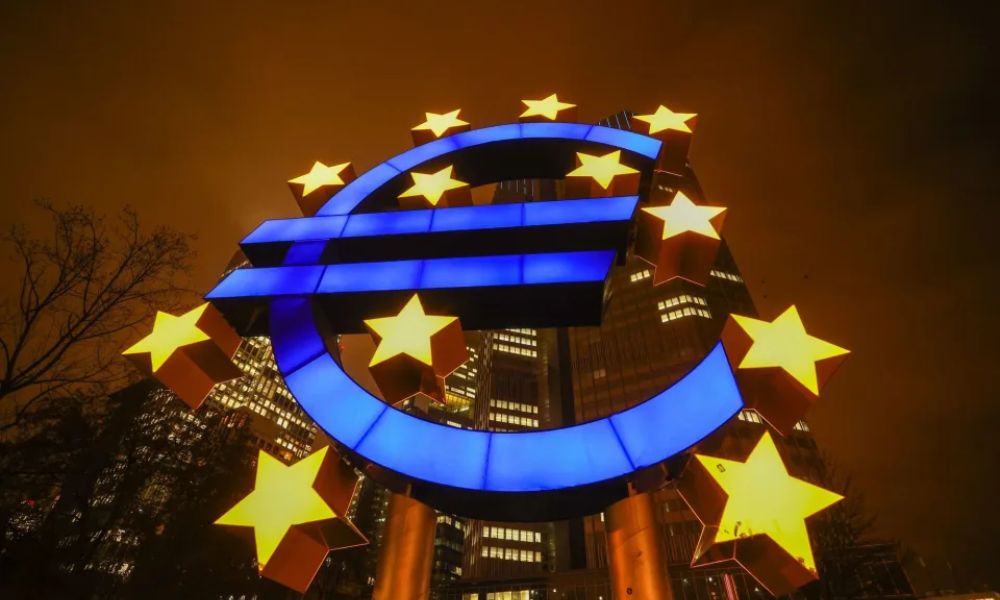
The European Central Bank is set to lift interest rates by another quarter-point as investors ponder if this could be the final salvo in officials’ yearlong campaign of hikes.
Thursday’s advance in the deposit rate to 3.75% has been widely flagged by President Christine Lagarde and her colleagues. What’s of most interest is whether policymakers will raise again when they next convene in September, or whether they’ll refrain.
Clues on the outcome of that meeting are unlikely, with a flood of data due in the interim and recent figures revealing fiercer underlying inflation pressure alongside a weakening euro-zone economy.
Announcing its decision, after Wednesday’s hike by the Federal Reserve, communication may be the ECB’s key challenge. Policymakers will want to retain maximum flexibility by not sending too-decisive a signal in either direction.
The odds of this week’s step being the last in the cycle have risen after traditionally hawkish ECB officials sowed doubts about a September move. A slim majority of economists polled this month by Bloomberg still predicts a 4% peak in the deposit rate, though they’re not convinced policymakers will be able to stick at that level for as long as they want.
The announcement from Frankfurt is due at 2:15 p.m., with Lagarde’s news conference to follow half an hour later.
Wording in the ECB’s June statement indicating rates “will be brought to levels” that are “sufficiently restrictive” will probably have to be tweaked so as not to signal further action still to come. Any new language is likely to fuel a barrage of questions for Lagarde.—Bloomberg Economics.
“Lagarde will probably announce another 25 basis-point rate increase, communicate that the decision in September will depend on the data and emphasize that rates won’t be cut anytime soon.”—David Powell, senior euro-area economist.
With hikes approaching their end, the focus is slowly shifting to when the ECB can start thinking about lowering interest rates again. Analysts expect a first cut just six months after the peak emerges — a prospect officials have tried to push back against.
There’s also been speculation that the ECB could narrow the gap between the deposit rate and the rate at which banks can borrow money for seven days.
With liquidity abundant, the latter facility hasn’t been used much in recent years. But as lenders return cheap long-term funding, officials may want to reduce the costs of tapping it.
Doing so could be tricky, however, as any move could signal intentions about the direction of monetary policy that the ECB may prefer to avoid — especially as it continues to weigh the delayed impact of its 400 basis points of tightening to date.
While no quarterly forecasts from the ECB arriving, the economic outlook will play a prominent role in discussions. Recent data point to a worsening in conditions, with a survey of purchasing managers by S&P Global showing private-sector activity contracted in July.
Manufacturing is a particular weak spot and Germany — where that sector plays an outsized role — is struggling to exit the recession it fell into over the winter. The question is how that stacks up against more resilient services activity and a labor market that’s showing few signs of softening.
For now, the core gauge of inflation that officials have been focusing on remains elevated, ticking up to 5.5% last month — well above the 2% target. Updates from Eurostat on price growth and economic output will be published on Monday.
The Governing Council is also in the midst of picking a candidate to succeed Andrea Enria as head of the ECB’s bank-supervision arm when the Italian official steps down at year-end. The choice is between Bank of Spain Deputy Governor Margarita Delgado and Bundesbank Vice President Claudia Buch.
While the ECB has said a decision will come in the autumn, it’s also possible this week. Whoever’s nominated must still be approved by the European Parliament and confirmed by European Union governments.
Source: Yahoo.com